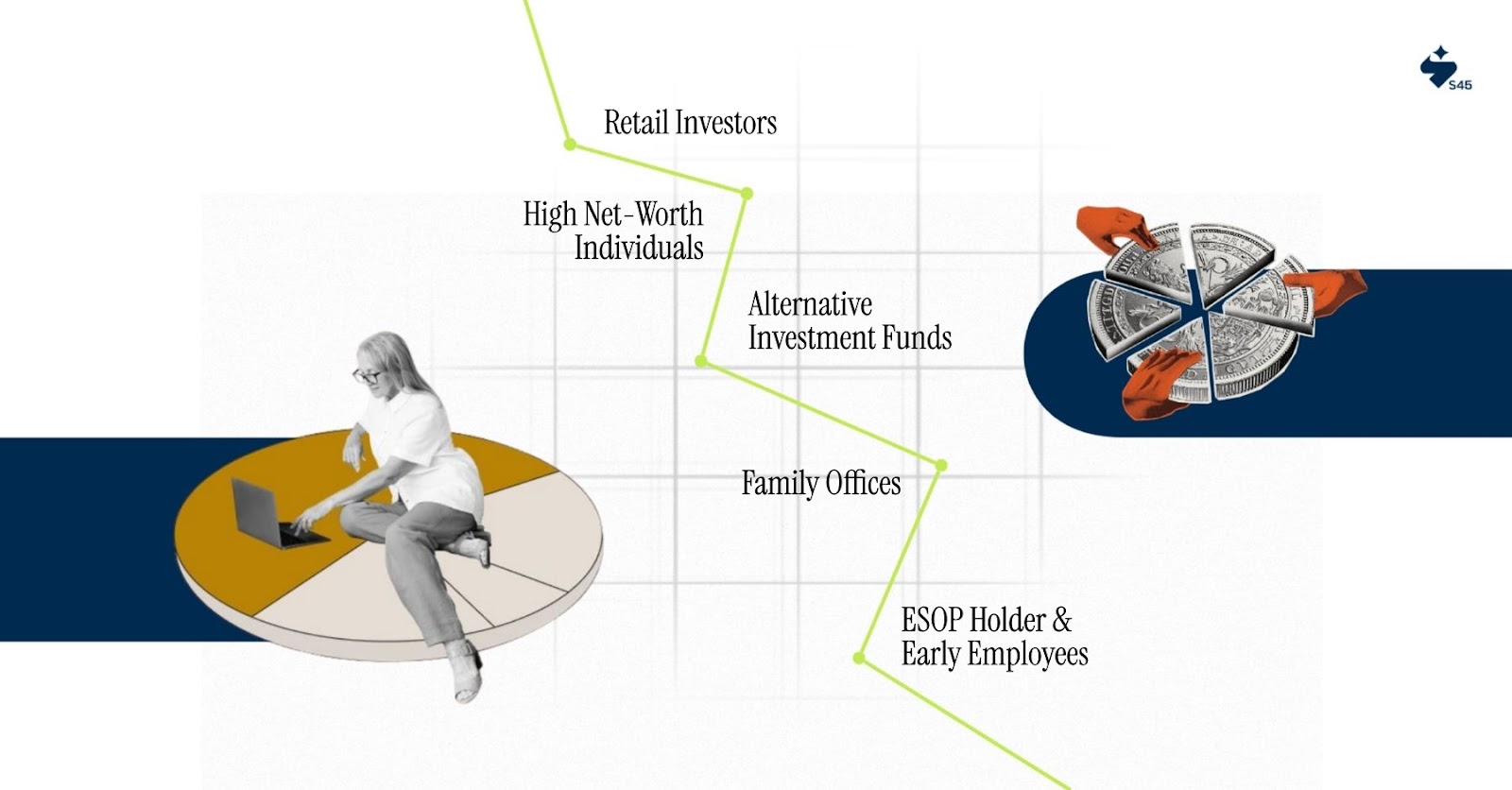
Key Takeaways
- Pre-IPO investing offers early access to high-growth companies before they go public.
- Investors can benefit from discounted share prices and potential multibagger returns.
- It involves risks like limited liquidity, valuation uncertainty, and lock-in periods
- Ideal for late-stage investors, portfolio diversification, and long-term strategies.
- Thorough due diligence, timing, and investor eligibility are critical for success.
Are you curious how high-growth companies can be accessed before going public?
Pre IPO investing allows you to buy shares in startups or firms before they list on exchanges. In India, interest in pre IPO deals has grown as the IPO pipeline strengthens. The Indian IPO market raised $4.6 billion during the first half of 2025, with 108 IPO deals.
These unlisted transactions provide early access to companies, allowing investors to capitalize on listing excitement and market pricing before values increase. But pre IPO shares carry unique risks around liquidity, valuation, and holding periods. Understanding the meaning and workings of pre-IPO investing can help you assess whether it suits your growth mindset.
In this guide, you will learn what pre-IPO investing entails, how it works in India, who can participate, and how to make practical access and funding decisions around these opportunities.
What is Pre IPO Investing?
Pre IPO investing means buying shares in a private company before it lists on the stock exchange. These shares are usually sold by founders, early employees, or early-stage funds. Such investors often want to exit or rebalance holdings partially. In India, these opportunities frequently arise during late funding rounds or on unlisted share platforms. Pre IPO investment gives you early access to companies nearing a public offering but still private.
Unlike public market investing, pre-IPO deals happen off-market. These deals do not offer the same price transparency or liquidity. You do not get immediate entry or exit like with listed stocks. However, if timed well, the upside can be attractive. It is due to the lower entry valuation compared to post-IPO levels.
Investors in India now pursue pre IPO investing as startups mature and aim for public listings. To understand the mechanics, you need to know how pre-IPO investing works.
How Does Pre-IPO Investing Work?
Pre-IPO investing allows investors to buy shares in a company before it goes public. These shares are typically sold by early employees, founders, or investors looking to exit. Unlike public market buying, pre-IPO investments involve more steps and higher risks, but offer the potential for significant returns.
Here’s a simple breakdown of how pre-IPO investing works from start to finish:
- Access Opportunities: Investors usually find deals through private networks, investment platforms, or SEBI-regulated funds like AIFs. These sources curate companies expected to go public in the next 1–3 years.
- Review Company Details: Companies share key data such as revenue, business plans, or valuation. While disclosures are fewer than listed companies, investors get enough to judge basic potential.
- Perform Due Diligence: Before buying, investors check the company’s growth history, founders, legal structure, and past funding. They may also review risks, dilution possibilities, and exit history.
- Enter Purchase Agreement: If interested, the investor signs a private share purchase agreement. It details how many shares they get, at what price, and the lock-in terms post-IPO.
- Hold Shares Until Exit: Once shares are allocated, investors must hold them until the IPO or a liquidity event. Some shares have a post-IPO lock-in period, especially for larger investments.
- Regulatory Oversight: While not directly regulated like listed stocks, pre-IPO deals must comply with SEBI norms when routed via formal structures like AIFs or PMS. It adds a layer of investor protection.
- Understand the Risks: These deals are not liquid. There’s no public market to sell early. Delayed IPOs, price corrections, or company failure may impact returns.
Pre-IPO deals require more patience and care than public markets. But with the right checks, they can open interesting early-stage exposure. But, how to avail them? Let’s find out.
How to Invest in Pre-IPO Deals in India?
Pre-IPO investing isn’t limited to big institutions anymore. With more access points, even individual investors can participate if they understand where and how to look. Entry depends on your investor profile, access, and risk appetite.
Here are five common ways to access pre-IPO deals in India:
- Direct Investment: Accredited or high-net-worth individuals (HNIs) may receive private offers to invest in pre-IPO rounds. These often come through personal networks, private bankers, or company insiders. Investors typically commit larger amounts and are bound by long holding periods and formal agreements.
- Platforms: Several SEBI-registered online platforms offer curated pre-IPO shares. These platforms list deals from late-stage startups or unlisted firms close to IPO. Retail investors can participate with smaller ticket sizes, but availability depends on deal demand and investor eligibility.
- Angel or VC Route: Early-stage investing is another path. Join a syndicate, angel group, or venture capital network to fund companies long before IPO. This route needs capital, a long-term outlook, and a readiness to accept higher risk for higher potential returns.
- Secondary Markets: Unlisted share platforms or brokers connect sellers and buyers of pre-IPO shares. These secondary deals let you buy stock from existing employees, funds, or founders. Liquidity is limited and pricing may vary, but it’s one way to enter near-IPO opportunities.
- Mutual Funds/ETFs: Some AIFs, PMS, or thematic funds invest in companies aiming for IPO. These let you get exposure without picking individual stocks. However, they often come with minimum investment requirements and professional management fees.
Each route offers unique access, risk, and control. Choose one that matches your capital, risk profile, and long-term plan. But who all can invest? Let’s discuss them.
Who Can Invest in Pre-IPO Shares?

Pre-IPO investing in India isn’t open to everyone. It often depends on your investor profile, access, and financial readiness. Regulatory checks like KYC, PAN verification, and minimum ticket size apply.
Here’s a look at who typically qualifies to invest in unlisted shares.
- Retail Investors
Retail participation is limited and usually comes through SEBI-registered platforms that offer fractional access or pooled investments. Retail investors still face restrictions in deal access and may have to meet a minimum investment amount, often around ₹14k, for mainstream IPOs per lot. But for SME IPOs, the minimum investment amount is more than 1 lakh per lot.
- High Net-Worth Individuals (HNIs)
HNIs, those with investable assets above ₹2 crore, often get invited to private placements. They have access to curated pre-IPO deals through wealth managers, brokers, or direct networks. Ticket sizes are higher (more than ₹2-5 lakh), and due diligence is essential before entering into any agreement.
- Alternative Investment Funds (AIFs)
AIFs invest pooled capital from qualified investors into pre-IPO shares. These are SEBI-regulated and target startups or late-stage companies. AIFs offer diversification and professional management but come with lock-in periods and high entry thresholds, usually starting from ₹1 crore.
- Family Offices
Family offices manage wealth for affluent families and often take strategic pre-IPO positions. Their scale allows direct negotiation with companies and access to exclusive rounds. They are well-suited for long-term holding and often perform extensive due diligence before investing.
- ESOP Holders and Early Employees
Employees with stock options often hold unlisted shares. Some may sell part of their holdings through secondary transactions before the IPO. However, such sales must follow company policy and regulatory requirements, including lock-in periods and approvals.
Regulatory compliance is key for all investor types. SEBI oversight ensures fair practices, and all transactions must go through proper KYC, agreements, and transfer protocols.
Pre-IPO access depends on capital, access, and timing. Understanding where you fit helps you make smarter entry decisions.
Why Invest in Pre-IPO Companies?

Pre-IPO investing can open the door to early gains and unique access. You’re not just buying shares; you’re buying a head start. Investors are drawn by better pricing, potential upside, and the chance to be part of a company’s journey before it hits the spotlight.
Here are some reasons why people choose to invest early:
- Early Bird Wins
You get access to high-growth companies before the general public. It means a chance to buy into a strong business during its scaling phase. If the company performs well post-IPO, the early entry could turn into a strong win.
- Cheaper Shares
Pre-IPO shares are often offered at discounted prices. If you get in before the IPO buzz, you may benefit from a lower entry point. It creates room for gains if the IPO pricing is higher and market interest follows.
- Stable Start
Many companies reaching the pre-IPO stage already have solid revenues and operations. It offers some insulation from the early-stage chaos of startups and the high volatility of newly listed companies adjusting to public markets.
- Big Returns
If the company grows after its IPO, the upside can be large. You may see returns multiple times higher than your entry price. It’s riskier, yes, but if timed well and chosen wisely, it can be highly rewarding.
- Connections
Pre-IPO deals often come through networks, funds, or direct channels. It opens access to founders, insiders, and other serious investors. Relationships formed during these rounds can help in future opportunities or startup ecosystem insights.
While it’s not for everyone, pre-IPO investing offers an edge that’s hard to find in public markets. That edge gets even sharper when you choose the right company and the right time. But there are also risk factors that you need to consider before showing interest in IPOs.
Factors to Consider Before Investing in Pre-IPO Stocks
Pre-IPO investing can be exciting, but it comes with risks that public investors don’t usually face. These companies are still private, which means less information, longer holding periods, and uncertain exits. If you're considering it, keep these factors in mind before putting your money in.
Here are the key risks and considerations:
- Lack of Liquidity
Pre-IPO shares can’t be sold easily. You may have to hold them for years until the IPO or a secondary sale. If you need quick access to your money, this type of investment may not be a good fit.
- Valuation Uncertainty
Private company valuations aren't always clear. Without market pricing, it’s harder to judge whether the share price is fair. Overpaying for a pre-IPO deal can reduce your chances of solid returns even if the company succeeds later.
- Regulatory Hurdles
Every pre-IPO deal in India must comply with SEBI regulations. Investors need to complete KYC checks and may face restrictions based on the type of investment route used. Missing these details can delay or cancel the deal.
- Dilution Risk
Founders may raise more rounds before going public. Each round could dilute your ownership. Even if the company performs well, your final stake may be lower than expected unless you join follow-up rounds.
- Long Timelines
There’s no set timeline for an IPO. Some companies wait years or change direction entirely. Your capital could remain locked with no clear idea of when (or if) you'll see returns.
- Company-Specific Risks
Startups can fail, screw up, or hit regulatory or market issues. Even if the business looks strong today, pre-IPO investing includes risks that come with limited data, changing leadership, or shifting goals.
- Exit Uncertainty
Even after the IPO, selling your shares might come with lock-in periods or low volumes. Secondary markets may not always offer a clean exit if the IPO doesn’t perform as expected.
Pre-IPO investing isn’t just about the upside; it’s about knowing the risks and preparing for a long game. Some early investors do strike gold, and that’s where we head next: examples of Indian pre-IPOs that paid off big.
Real Examples of Pre-IPO Investments in India That Turned Out Big
Some of the biggest wealth creation stories in the Indian stock market began long before a company ever rang the IPO bell. Pre-IPO investors often take higher risks, but the payoff can be massive when it works out. In the last 3 years, 15 multibaggers have turned Rs 1 lakh into at least Rs 50 lakh, generating up to 84,000% returns.
Let’s look at some high-profile pre-IPO winners:
- Nykaa (FSN E-Commerce Ventures)
Investors like Steadview Capital and TPG Growth entered during early funding rounds. When Nykaa listed in 2021, shares were offered at ₹1,125, over 70x their early-stage valuations. A ₹1 lakh investment in 2014 turned into ₹50+ lakh at peak post-listing.
- Zomato
Info Edge was an early investor in Zomato, owning over 15% pre-IPO. Their stake turned into a goldmine during the 2021 IPO. Shares priced at ₹76 saw huge listing gains, and early investors booked 10x to 20x returns, depending on the entry round.
- Paytm (One97 Communications)
SoftBank and Alibaba entered early, backing Paytm’s mobile wallet dream. While the IPO in 2021 was rocky, pre-IPO investors who entered at lower valuations still saw healthy exits, with 5x–8x gains over 6–8 years.
- Policybazaar (PB Fintech)
Investors like Temasek and Tiger Global entered pre-IPO. Even with moderate post-listing movement, long-term backers made over 15x returns from early rounds between 2013 and 2020, thanks to high business growth and valuation jumps before IPO.
- Nazara Technologies
Rakesh Jhunjhunwala famously invested in Nazara years before listing. By the time of IPO in 2021, his stake had multiplied more than 50 times. The gaming company rewarded patient early investors with a ₹1 lakh bet turning into ₹50 lakh+.
These stories show how smart pre-IPO bets backed by research and patience can create real wealth. But timing matters just as much as the company itself, and that’s what you will understand next: when to consider pre-IPO investing.
When Should Founders or Investors Consider Pre-IPO Opportunities?
Timing plays a key role in the success of any pre-IPO investment. For investors, it’s about entering when the business has matured but still holds upside potential. For founders, it's a way to raise funds without the pressure of public scrutiny. Pre-IPO opportunities often sit at the crossroads of ambition and momentum.
Here’s when it makes the most sense:
- When the Business Has Proven Traction
A pre-IPO round works best when the company has a steady revenue model, strong growth metrics, and a clear roadmap to profitability. It gives investors more confidence and justifies premium valuations before public entry.
- For Late-Stage Capital Needs
Founders often raise pre-IPO rounds to meet expansion, marketing, or acquisition goals before going public. It covers the gap between growth-stage VC funding and the IPO, especially for scaling operations.
- When Investors Seek Portfolio Diversification
HNIs, family offices, and institutions may invest in pre-IPOs to diversify beyond traditional equity markets. It’s a strategic bet on innovation and market disruptors not yet available on stock exchanges.
- If You’re an Experienced or Accredited Investor
Ideal pre-IPO investors are those with the risk appetite, network access, and patience to wait through the illiquid phase. These may include seasoned angel investors, VCs, or HNIs with a long-term outlook.
- When Market Sentiment Supports Strong IPOs
Bullish public markets often push startups to prepare for IPOs. If you're investing just before such a wave, there's potential for quicker exits and strong returns, provided the fundamentals are solid.
- When Exit Timelines Align with Your Financial Goals
Pre-IPO deals are not ideal for short-term liquidity. But if your horizon is 3–5 years, and you’re willing to stay invested until the listing, the reward-to-risk ratio can be favourable.
- If You’ve Done Your Due Diligence
Whether you’re a founder or an investor, pre-IPO moments require clarity on valuation, governance, cap table, and market fit. The right time is when your research supports the leap.
Pre-IPO investing is a mix of insight, access, and timing. If that sounds like your playbook, it might be time to consider how to make it work for you with platforms like S45.
How S45 Helps You With Pre-IPO Investing?
S45 is a modern equity advisory platform built for forward-thinking investors, startup founders, and family offices exploring private market opportunities. With a deep understanding of startup equity and access to curated pre-IPO deals in India, S45 bridges the gap between ambition and informed action.
Whether you're an experienced investor or a first-time entrant into the unlisted space, S45 ensures you don't just invest, you invest smartly.
To help you make the right calls, S45 brings together expertise, access, and insights in one place:
- Strategic Entry Support: S45 evaluates where the company stands in its growth cycle and helps you identify the right time to enter. You gain clarity on business maturity, IPO timelines, and the potential for upside.
- Due Diligence That Goes Deeper: Get more than surface-level metrics. S45 analyses company fundamentals, cap tables, governance, market potential, and founder history, giving you a 360° view before you commit your capital.
- Access to Quality Deals: With deep networks in India’s startup ecosystem, S45 offers access to pre-IPO companies that are usually out of reach for retail or newer investors. It connects you to credible, late-stage opportunities.
- Understanding Risk, Not Just Chasing Returns: Every investment comes with risk. S45 ensures you’re aware of them. It helps you evaluate illiquidity periods, realistic return timelines, and exit scenarios so you invest with your eyes open.
- Equity Advisory for Smart Diversification: From helping family offices balance portfolios to guiding founders looking to liquidate ESOPs, S45 acts as your equity partner in building a diversified private market strategy.
If you're considering pre-IPO investing, don’t go in blind. Speak to S45 today! Your partner is informed, well-timed, and strategically sound in making decisions.
Conclusion
Pre-IPO investing offers early access to high-growth companies before they hit the public markets, with the potential for exponential returns. But it requires a deeper understanding of timelines, risk, and valuation.
In India, pre-IPO participation depends on investor type and regulatory factors. Retail investors, HNIs, AIFs, family offices, and ESOP holders each have different eligibility and entry routes. While benefits include discounted pricing and strong upside, risks like illiquidity and long lock-ins must be weighed carefully.
Pre-IPO investments work best for investors seeking diversification or for founders raising late-stage funding. Strategic timing, realistic goals, and informed decisions are essential.
S45 simplifies this journey. From deal access and due diligence to personalised strategy, S45 offers smarter investment strategies. Our trusted founder community connects you with like-minded investors and capital-ready opportunities. Partner with S45 and take confident steps in India’s pre-IPO scenery.
Frequently Asked Questions
1. Is pre-IPO investing legal in India?
Yes, pre-IPO investing is legal in India. Investors can access shares of private companies through recognized platforms, private placements, or alternative investment funds. However, such investments must comply with SEBI regulations and require proper KYC and documentation based on investor type and transaction route.
2. How to invest in pre-IPO shares?
You can invest in pre-IPO shares through specialized equity advisory firms, private placements, investment platforms, or secondary markets. Eligibility, ticket size, and access vary by investor profile. It's essential to conduct due diligence or consult with experts to evaluate risks and verify the legitimacy of deals.
3. What is the lock-in period for pre-IPO shares?
In India, pre-IPO shares typically carry a lock-in period of six months after the company's public listing, as per SEBI rules. During this time, investors cannot sell the shares on the open market. Additional lock-ins may apply depending on the nature of the investment agreement.
4. Is it safe to invest in pre-IPO?
Pre-IPO investing can offer high returns but comes with notable risks. These include low liquidity, company performance uncertainty, and limited access to information. It’s important to assess valuation, exit timelines, and regulatory clarity before investing. Engaging with trusted advisors improves safety and decision-making.
5. Can retail investors buy pre-IPO stocks?
Yes, retail investors in India can access pre-IPO shares, but opportunities may be limited. They can invest through regulated platforms or pooled investment vehicles. Minimum investment thresholds and due diligence requirements apply, so retail participants should proceed cautiously and ideally consult with experienced equity advisors.
